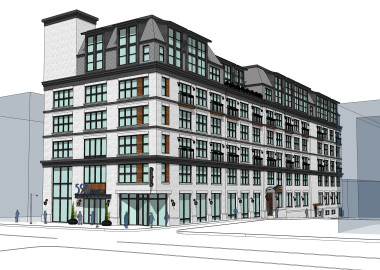Croc Rock to be demolished to make way for City Center development

Crocodile Rock, the home sweet home of ’80s hair metal, pop, punk and local acts on Allentown’s Hamilton Street, is about to embark on a farewell tour. Allentown’s Zoning Hearing Board approved City Center Investment Corp.’s application Monday to demolish the former concert venue in the 500 block of Hamilton.
The building will be razed to make way for a six-story mixed use building offering retail and office space on the ground floor topped by five stories of residential units. Representatives of City Center unveiled a rendering for the first time Monday of its proposed structure, which is modeled after the former Hotel Allen that once sat at Seventh and Hamilton streets.
While Croc Rock may be historically significant to the Lehigh Valley — it once ranked among the world’s top 100 club-sized music venues and sold 50,000 tickets annually — Allentown zoners agreed with City Center officials that the building itself is not historically significant.
Building records show that the current structure on the site was built in the 1960s, said Robert DiLorenzo, project manager for City Center. Dennis McCarthy, an attorney for City Center, said the city ordinance that protects buildings along the stretch of Hamilton Street where Croc Rock sits is designed for buildings built prior to 1948.
In a report presented to the zoning board, Allentown’s Historical Architectural Review Board found that the facade of Croc Rock was not historically significant and the demolition would not have a negative impact on the block.
Allentown zoners concurred, stating that the building meets several prongs of a four-prong test required to demolish a building in the historic district. Only one prong of the four is required to meet the standard for demolition.
Adrian Shanker, executive director of the nearby Bradbury-Sullivan LGBT Community Center, applauded the decision, saying the current building is a “drain” on the neighborhood.
“There are more squirrels that enter the current building than people,” Shanker said. “It harms our ability to attract community members to come downtown.”
Croc Rock has been largely vacant for two years, but its decline began in earnest in 2013 when the club lost its liquor license. Owner Joe Clark continued to hold shows at the venue for two more years, attempting to court fans too young to drink, but no live acts have played there since 2015. Clark has maintained for years that he would renovate the club and last year floated a proposal to convert the club to a combination concert venue and motel.
DiLorenzo said Monday that City Center has an agreement of sale for the club, but said a closing date has not been set. City Center officials would not disclose how much they plan to spend to redevelop the property.
City Center’s proposal for the site is a departure from the brick, steel and glass structures that have dominated the nearly $400 million in development the company has already built in Allentown using tax credits from the city’s Neighborhood Improvement Zone.
This time, the company’s design is modeled after some of the city’s historical structures, featuring a sloped mansard-style roof similar to the one that adorned the Hotel Allen. The historic hotel was torn down decades ago and replaced with an office building that City Center demolished to clear the way for Two City Center.
Jane Heft, vice president and design director for City Center, said the company wants to bring back some of the character of the old buildings that once graced Hamilton Street. The proposed building will meld the older style with newer amenities, she said.
“We’re living up to our promise to mix it up,” she said. “We’re not trying to build a robot city.”
Heft said City Center has not decided how many units will be in the building, but demolition is slated for August. Crews could break ground for the new building in November with approval from the city’s Planning Commission, she said. The building is expected to be occupied by September 2018.
Joel Wiener, an attorney for Commonwealth Realty, owner of the neighboring Commonwealth Building, was the only objector to the plan at Monday’s meeting. Wiener didn’t offer a reason for objecting to the proposal but questioned several of City Center’s assertions about the property, such as the fact that it is vacant. Wiener said the property is still used for warehousing purposes and as a real estate office for Clark, a fact that City Center officials acknowledged.
Alan Salinger, a member of the zoning board, said the proposal for the site would be a “substantial benefit” to the surrounding neighborhood, which had been “pretty sleepy” until City Center redeveloped several other properties on the block.
“This will create more foot traffic and more activity on the street,” he said.
Written by Emily Opilo; Published by The Morning Call
< Return to Noteworthy